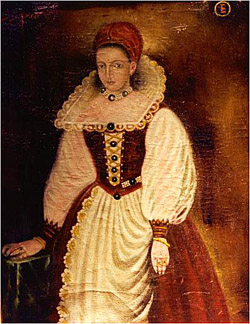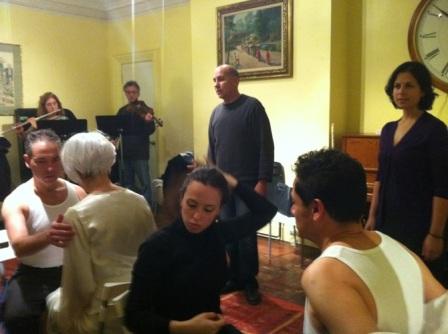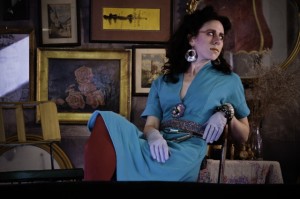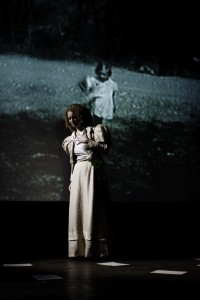
After a long gestation, which included multiple workshops that presented excerpts of the work in progress, this weekend David T. Little’s Dog Days will be given its premiere as a full length opera. It is being presented at Montclair State University in Montclair, New Jersey on September 29th through October 7th. Despite all the myriad details to which he’s had to attend in the rehearsals leading up to the performances, David was kind enough to consent to an interview about the bringing this long term project to fruition and some of his other current activities.
Sequenza21: When did you first become aware of the short story on which Dog Days is based? Why did you think it would be a good subject for your first full length opera?
I first encountered the story Dog Days in the film adaptation by Ellie Lee. (The original story is by Judy Budnitz.) I was living in Ann Arbor at the time, and had gotten into the habit if composing each morning with the TV on in the distant background. It would usually start with the previous night’s Daily Show; then, I’d switch to IFC. On one particular day, IFC was showing a shorts program. I happened to look up at a certain moment, and catch a glimpse of Spencer Beglarian (late brother of Eve) playing Prince, the man in a dog suit. I immediately thought: “what the hell” and couldn’t look away, almost obsessively watching the entire film. I filed this piece away, thinking of it as a work I really liked, by an artist I respected, and then sort of moved on with my day. I wrote a song some time later, called “After a Film by Ellie Lee,” about the landscape of Dog Days–and even got to meet Ellie in 2003–but never really thought of making it an opera.
Then in 2008, Dawn Upshaw contacted me and asked if I’d be interested in writing something dramatic–a scena, or opera excerpt–for the Dawn Upshaw/Osvaldo Golijov Workshop at Carnegie Hall. I of course said yes–because that’s what you say to Dawn Upshaw!–and began looking for a libretto. I had written the libretto for Soldier Songs myself, but those were all monologues. This piece was to have characters who needed to have actual dialogue, which I didn’t feel I could handle that as a writer. So I approached Royce Vavrek, who I’d met maybe six months earlier after an American Lyric Theater performance, and we started talking about ideas.
After looking through a number of options, we kept coming back to Dog Days as a piece that just made sense. It was dark, but with these wonderful moments of light. It got into very serious issues–the animal/human divide, issues of choice and consequence, questions of how we treat the least fortunate among us–but without being heavy handed about it. It felt like the perfect story to use for our first adaptation, and it’s proven to be an incredibly rewarding text to write with. (Plus, it had the right number of characters to match the singers we’d been assigned!) We approached Judy Budnitz for permission, she granted it, and we got started. (Judy, by the way, is a really terrific author and unique storyteller. If people don’t know her work, I hope they will check it out.)
What’s been changed or added since presenting scenes of Dog Days at Carnegie Hall?
We added a whole lot! The Zankel presentation was only about 20 minutes, and when we did it at Vox (2010) we had about 30 minutes, having written the aria “Mirror Mirror” for one of American Opera Projects’ Opera Grows in Brooklyn programs in the summer of 2009. But the piece now lasts about 2 hours and 15 minutes with the intermission, so it has more than doubled since those early presentations. Also, a number of the voice types changed. I mentioned that we were assigned the singers for the Carnegie Workshop. We loved all of them, but, as we worked on the libretto, came to feel that some of the voice types weren’t right for whom the characters were becoming. For example, Howard–the father–started off as a tenor, but is now a baritone. So in addition to the new music, we also had a lot of rewrites to the old music. Even after the workshop in April, we continued to rewrite, and have continued to tweak throughout the rehearsal process. We added a character who was not present in the original version (though is present in the story): the Captain, a military officer played by Cherry Duke who brings the two sons back from mischief, and tries to make a devil’s deal with Howard. This aria was written maybe eight months ago.
The last big thing was that we finally have a dog man, played by the amazing John Kelly. In the Carnegie Hall performance, Prince was just not there–since it is not a sung role–so all the singers were singing to an invisible man. That’s changed in the stage version. Works much better now! (more…)











